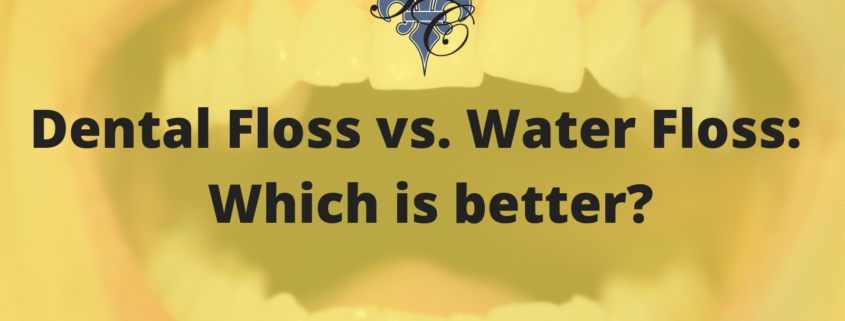Dental Floss vs. Water Floss: Which is better?
Do you floss your teeth every day? If you’re not flossing, you should be. Flossing, whether you’re using conventional dental floss or a water irrigator (water floss), is important for removing plaque and debris between teeth and along the gum line.
Flossing properly and daily can reduce your risks for developing dental caries and periodontal (gum) disease. In fact, brushing only cleans about 70% of oral surfaces when performed correctly, so it is important to perform daily Interdental cleaning to safeguard your oral health.
If you’re on the fence about what kind of floss to use, read on for a breakdown on these two Interdental cleaning methods.
Traditional Dental Floss
Flossing with traditional dental floss is effective at removing surface debris from leftover food and daily plaque deposits. Dental floss is thin but strong enough to clean deep between teeth where a toothbrush cannot reach. If you floss correctly, you can control plaque accumulation, disrupt the formation of bacterial colonies at the gum line, and remove food particles lodged in hard-to-reach areas.
Traditional dental floss comes in two varieties: unwaxed and waxed. Many people find that using waxed dental floss is easier and more comfortable.
Water Flossing/Water Irrigators
Water flossing involves using a handheld device that emits pulses of water streams. These streams of water help flush the spaces between teeth and along the gums. Water floss can remove plaque and debris from food but some dentists disagree on whether this form of Interdental cleaning is superior to conventional flossing.
Some people choose to use water irrigators in conjunction with conventional flossing and brushing. Others with braces or prosthetics like bridges may choose to use a water irrigator because it is more convenient. Those with fixed and implant-supported bridges benefit from using water flossers to clean underneath their prosthetics.
Floss Like a Professional
Flossing is important and the techniques with which you floss can make a difference in reducing your risks for common oral diseases. Improper flossing will not remove bacteria and plaque as thoroughly as using proper flossing technique. Moreover, the quality of the tools you use for Interdental cleaning matters. Always look for the American Dental Association’s (ADA) seal of acceptance when purchasing any oral hygiene products.
Dental Floss: Tips and Tricks
Dentists and dental hygienists are experts at making the most of dental floss. Their technique for flossing, even with conventional dental floss, is effective at cleaning hard-to-reach areas in the oral cavity. When you mirror the technique of the pros at home, you take charge of your oral health.
First, begin with about an 18-inch strand of floss. Wrap dental floss around each index finger or middle finger (whichever is more comfortable). Leave a section of one to two inches of floss between your fingers. Your thumbs can come in handy for directing floss between your upper set of teeth. Use a clean one- to two-inch section of floss for each space between teeth. Using clean floss for each section is important because dirty floss can lodge unwanted food and bacteria between teeth.
Be sure to floss gently and slowly. Vigorous and improper flossing could cut into the gums, increasing your risks for gingival irritation and inflammation. With practice, you can floss like a pro and strengthen your oral health in the process.
Water Floss: Tips and Tricks
Many people enjoy using water flossers because it is easier to use. Instead of threading conventional floss between teeth, you will hold a handheld device over each section between teeth and along the gums. This device will send a gentle yet steady stream of water that helps remove food particles and plaque.
Water flossers are very helpful for cleaning behind the archwires and around the brackets of braces, too. Some people find cleaning underneath prosthetics like bridges with water irrigators convenient as well. You can also use your water irrigator to dislodge food from the pits and fissures of teeth. This is a handy method for ensuring that the molars at the back of your mouth are clean.
When buying a water flosser, be sure to consult with our Lafayette, LA dentist for product recommendations. You can also look for the ADA seal of acceptance on water floss packaging to ensure that you’re buying a quality product.
Our general and restorative dentist is happy to make recommendations for oral care products and provide additional tips for effective oral hygiene practices. We serve patients throughout Lafayette, LA. Call our practice to schedule an appointment for a cleaning or checkup.



